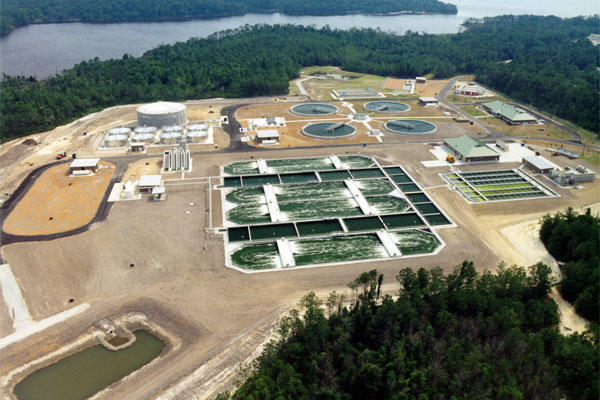The Veterans Affairs Department on Thursday announced plans to expand disability coverage for veterans exposed to contaminated water at Marine Corps Camp Lejeune in North Carolina.
For more than three decades, from 1953 to 1987, groundwater sources at the base were contaminated with industrial solvents leaking from underground storage tanks, according to the VA.
The pollutants included the dry-cleaning solvent perchloroethylene, degreaser trichloroethylene , petrochemical benzene, as well as vinyl chloride and dozens of other contaminants, the department said. Exposure to the solvents is linked to numerous health problems, from cancer to Parkinson's disease, it said.
"The water at Camp Lejeune was a hidden hazard, and it is only years later that we know how dangerous it was," Secretary Bob McDonald said in the release.
Navy and Marine Corps officials have downplayed the issue for years.
Speaking at a Sept. 14 event in Cleveland, Navy Secretary Ray Mabus said water at the installation has long been safe to drink and blamed the original problem on a nearby dry cleaner, according to an article by Patricia Kime, a reporter for Military Times.
Mabus acknowledged "allegations that there is a higher incidence of illness with people who had gone through as Marines," but said studies conducted by the Agency for Toxic Substances and Disease Registry "can find no correlation," according to the article.
Interestingly, the VA said its decision came about as a result of discussions between environmental health experts at this agency, which is part of the Department of Health and Human Services, and the Veterans Health Administration.
Lawmakers welcomed the VA's proposal.
"For decades, tens of thousands of service members and their families were potentially exposed to chemicals now connected to deadly cancers and other serious illnesses," Sen. Richard Blumenthal, a Democrat from Connecticut and the ranking member of the Senate Veterans Affairs Committee, said in a statement.
"Today's announcement that this exposure will qualify as service-connected is a critical first step toward providing disability compensation for men and women harmed in the line of duty," he added. "Generations of Marines, sailors and their families lived and worked at Camp Lejeune, and now the VA and Secretary McDonald must do everything in their power to expedite this regulation and conduct aggressive outreach to potentially-affected veterans."
Almost a million veterans, civilian employees, and their families were exposed to toxic drinking water at Lejeune, Blumenthal said. As of February, the VA had received 9,636 toxic water disability claims from Camp Lejeune veterans, denying 8,909 and granting 778, he said.
The VA currently provides benefits to veterans who served at Lejeune for 30 days or more between those 34 years, and were diagnosed with one or more of 15 health conditions, from esophageal cancer to renal toxicity to miscarriage.
McDonald proposed expanding coverage by creating "a presumption of service connection" for several conditions, including kidney cancer, liver cancer, non-Hodgkin lymphoma, leukemia, multiple myeloma, scleroderma, Parkinson's disease, aplastic anemia and myelodysplastic syndromes, the VA said.
McDonald's proposal would also expand benefits eligibility to Reserve and National Guard personnel who served at Camp Lejeune for any length of time from Aug. 1, 1953, through Dec. 31, 1987 -- making them eligible for VA disability compensation and medical care for the aforementioned conditions, and their surviving dependents eligible for dependency and indemnity compensation and burial benefits, the department said.
The VA won't grant any benefit claims based on the proposed presumption of service-connected disabilities until issuing final regulations at a later date. Even so, veterans who served at Lejeune during those years and who developed any of the conditions are urged to file a disability compensation claim by filling out the appropriate 526 form. For more information, visit the VA's compensation website.
Note: This story was updated to include the correct form and link to instructions for submitting a claim in the last paragraph.
-- Brendan McGarry can be reached at brendan.mcgarry@military.com. Follow him on Twitter at @Brendan_McGarry.




























